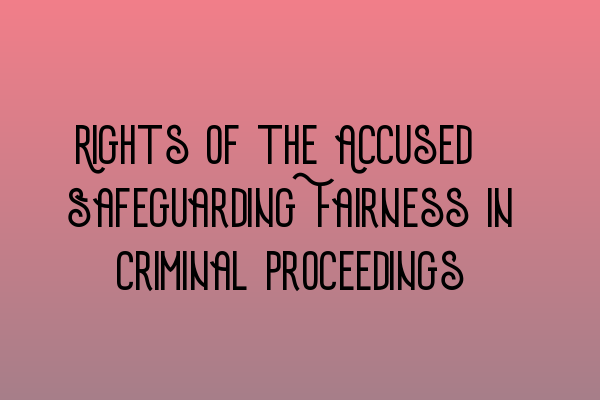Rights of the Accused: Safeguarding Fairness in Criminal Proceedings
When it comes to criminal proceedings, it is essential to ensure that the rights of the accused are protected at all times. The concept of fairness is a fundamental aspect of any legal system, and it is crucial to uphold it to maintain public trust and confidence in the criminal justice system.
The Right to Legal Representation
One of the primary rights of the accused is the right to legal representation. A fair trial requires that defendants have access to competent legal counsel who can provide them with effective assistance throughout the proceedings. In many cases, individuals facing criminal charges may not have the financial means to secure private legal representation. In such situations, it is crucial to ensure that legal aid services are available to guarantee equal access to justice for all.
For those preparing for their law exams, it is vital to practice scenarios related to legal representation. You can find helpful SQE 1 practice exam questions to enhance your understanding of this topic.
The Presumption of Innocence
Another significant right of the accused is the presumption of innocence. This principle dictates that an individual is presumed innocent until proven guilty beyond a reasonable doubt. It is the responsibility of the prosecution to present sufficient evidence to establish the defendant’s guilt. In criminal proceedings, it is vital to ensure that this presumption is upheld and that defendants are not treated as guilty before their guilt is proven.
The Right to a Fair and Impartial Trial
A fair and impartial trial is a cornerstone of the criminal justice system. It is crucial to safeguard the accused’s right to have their case heard by an unbiased tribunal. This includes the right to an independent judge and a jury selected without prejudice. Furthermore, it is essential to ensure proper adherence to procedural rules to guarantee that the trial is conducted fairly and that both the prosecution and defense have equal opportunities to present their case.
For those seeking to excel in their SQE exams, it is recommended to practice SQE 1 practice mocks to deepen their understanding of fair and impartial trials.
The Right to Confront Witnesses
The right to confront witnesses is a fundamental aspect of a fair trial. Defendants have the right to challenge the evidence presented against them and to cross-examine witnesses. This ensures that the accuracy and credibility of witness statements can be tested, allowing for a more robust and just decision-making process.
The Right to Remain Silent
The right to remain silent is a vital protection for the accused. Individuals facing criminal charges have the right to avoid self-incrimination and can choose not to testify or provide statements against themselves. This right ensures that defendants are not coerced into providing evidence against their own interests and helps to prevent wrongful convictions.
Protecting the Rights of the Accused
It is of utmost importance to protect the rights of the accused throughout the criminal proceedings. Establishing a fair and just legal system requires an unwavering commitment to upholding these rights. By safeguarding the right to legal representation, presumption of innocence, fair and impartial trials, the right to confront witnesses, and the right to remain silent, we can ensure that fairness and justice prevail.
For individuals preparing for the SQE exams, it is crucial to engage in comprehensive SQE 2 preparation courses to enhance their understanding of the legal system and the rights of the accused.
Conclusion
The rights of the accused are essential in maintaining fairness and ensuring the integrity of criminal proceedings. Upholding these rights is crucial for a just legal system that balances the interests of the accused and society as a whole. By protecting the right to legal representation, presumption of innocence, fair and impartial trials, the right to confront witnesses, and the right to remain silent, we can ensure the preservation of justice and safeguard the rights of all individuals involved in criminal proceedings.
